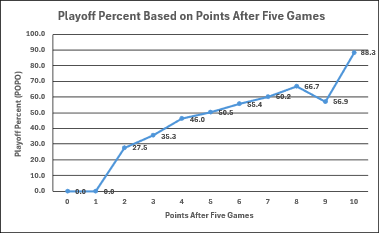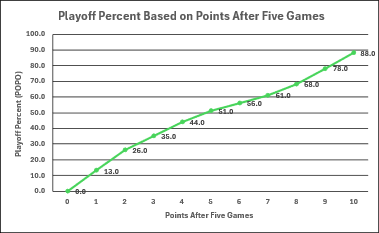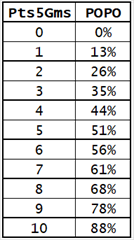Is the way a team starts a season important for their playoff chances? If your favourite team gets off to a rough start, you would probably think there is lots of time left for them to right their ship: with five games played, there are 77 games yet to play.
Unfortunately for you, the statistics show that the first five games are a reliable predictor of a team’s playoff chances. Some teams recover from poor starts, but most don’t. And don’t get too full of yourself if your team rushes off to a 4-0-1 start: they are not 100% likely to make the playoffs.
When This Article Was Written
This article was written in early October 2025. Writing started on October 8th, the day after the first three games of the season were played. It is the first article of the 2025-26 season.
2025 Approach – Timing of This Article
A Stapled To The Bench (STTB) article from last year (Five Games In – Playoff Chances) was written after all teams had played at least five games. This season’s article was written before any team had played five games.
2025 Approach – Slightly Different Methodology
As usual, STTB focuses on data since the 2007-08 season, the first season for which detailed player-level statistics are freely and publicly available. STTB’s favourite source of data is NaturalStatTrick.com (NatStat).
NatStat has a game report which I used for this article. One minor difference from last season’s article is that there is one more season’s worth of available data, that being the 2024-25 season.
The goal of this project was to estimate the playoff chances based on the points a team accumulates in its first five games of the seasons.
For example, 30 teams have earned two points in their first five games since 2007-08. The point ranges in the column headers may seem a little odd, but those ranges are important.
For each possible number of points a team could get in its first five games, I counted the number of times they finished the season in the final standing point ranges. Below are the counts for teams that started the season with 2 points and 7 points (F5 Pts).

2025 Approach – Final Point Ranges
The point ranges at the top of the previous table were chosen because the teams that finished in those ranges made the playoffs with a similar frequency. Teams that finished the season with fewer than 90 points never made the playoffs; teams with 90 or 91 points made the playoffs about one-quarter of the time; teams with 92 points made the playoffs about 50% of the time; teams with 93 to 95 points made the playoffs about three-quarters of the time; teams with 96 or more points always made the playoffs. These frequencies aren’t exact, but they are close enough for amateur work.
Between the counts and the playoff odds it was possible to calculate the playoff odds of a team that started the season with a certain number of points. The table below shows the calculation for teams that started the season with two points. POPO stands for Probability Of PlayOffs.

2025 Approach – Accuracy Over Precision
The precise POPO estimates for all “Points After Five Games” values are shown in the chart below. The values are very precise (in that the calculations are correct), but you will appreciate that they are not accurate (they do not reflect what should happen in reality).

The basic information is clear: the more points a team gets in its first five games, the better its season has tended to be, and thus the better it’s playoff chances should be.
There is an obvious problem with the POPO of teams with one and nine points after five games. Teams with one point should have a better chance than teams with no points, and teams with nine points must have a better chance than teams with seven or eight points.
The problem is related to the small size of the sample: this is randomness in action! I prefer accuracy to precision.
The POPO values were modified by hand, producing the second chart. The basic shape of the green line is like the blue line in the first chart, with the unseemly dips and dives removed.

This is STTB’s official Probability Of PlayOffs projections. Strangely, a table showing these data will almost certainly be easier to grasp.
2025 – Playoff Odds Based on Points After Five Games
This table converts the previous chart into more easily readable numbers. Pts5Gms stands for “points after five games played” and POPO stands for “Probability Of PlayOffs”.

Precision vs. Accuracy
Precision is related to what the numbers are. Is the source data correct? Were the calculations done correctly? In this case, the answer is largely yes with regard to the data being correct. As to the calculations being done correctly, the answer is yes.
The quibble with the data is in the range POPO values. Teams that finished with 90 or 91 points didn’t make the playoffs exactly 25% of the time; they did it around 25% of the time. Rather than use pedantically correct values, I preferred to use 25% increments.
We instinctively know that the precisely calculated 9-point POPO value (56.9%) is wrong, because it is less than the 7-point and 8-point POPO values. If this were an accurate representation of what would happen in a season, the logical conclusion is that a team with a 3-0-1 start going into its fifth game would do everything it could to not win. An overtime loss would be preferable, but a loss by any other method would be as sweet.
That is one way to tell that numbers which are precisely calculated produce information that lacks accuracy. Quantitative analysis, which focuses on numbers, is never enough when it comes to analysis. Qualitative analysis, which looks at concepts (among other things) will frequently help tell you what the numbers would tell you if the numbers were based on a large enough sample.
Summary
Good teams can start the season poorly, recover, and make the playoffs. Bad teams can start the season well, fall apart, and miss the playoffs. There is much, much more to making the playoffs than playing well in the first five games.
A significant part of these projections is that playoff-bound teams frequently play well in the first five games. They usually play well in any five games, when you think about it.
Related Articles
